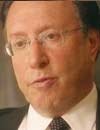- Floyd Abrams
First Amendment attorney - Ben Bradlee
Former editor, The Washington Post - Lucy Dalglish
Executive director, The Reporters Committee for Freedom of the Press - Norm Pearlstine
Former editor in chief, Time Inc. - Dana Priest
Reporter, The Washington Post - William Bradford Reynolds
Former assistant attorney general - Tom Rosenstiel
Director, Project for Excellence in Journalism - Bob Woodward
Reporter, The Washington Post
When Judy went to jail, you said that it would endanger all kinds of investigative reporting, but since then we've seen the NSA [National Security Agency] eavesdropping story, the SWIFT financial investigations story, stories about data mining done of phone records by other newspapers other than The New York Times. Seems like it didn't stop anything.
You never know. You never know what's not happening. There are newspapers which have much stricter policies now. Some of them simply won't use confidential source materials at all. Some of them will not authorize journalists or promise confidentiality at all.
The New York Times has continued to be out front and to run greater risks because it believes institutionally that it is so important that stories such as the later surveillance stories or banking record stories be published. But that is not the case of a lot of other publications.
[The Cleveland Plain Dealer.]
Yes. Cleveland Plain Dealer announced that they were not going to run a story because it was based on confidential source information and they couldn't take the risks. A lot of newspapers and publications simply cannot bear the financial risks.
And because Norm Pearlstine -- even though I disagree with him -- but [he] is not all wrong in talking about the dangers to corporations in situations like this. More and more media entities have moved in the direction of limiting the use of confidential sources, sometimes for good journalistic reasons, but sometimes to avoid risk.
Did the [special prosecutor Patrick] Fitzgerald investigation change the rules here in Washington or expose, let's say, the degree to which reporters both were using confidentiality but in turn were willing to give it up?
I don't think it's changed the rules. It made it harder, temporarily harder, in that case. ... I think it is normal for the government to try to keep out of the press what they want out of the press, and that's not changed.
Have you ever seen a time when a half a dozen reporters have testified before a federal grand jury before: Time magazine, NBC News, The Washington Post, eventually The New York Times?
I think probably it's as advanced as I've ever seen it, but it's not revolutionary. It's not the first time any of this stuff has happened. ...
The Miller case, apparently, it had an impact with the Cleveland Plain Dealer. Tell me what happened there.
... Just after Judy got sentenced, and we knew that the law was going badly, the Cleveland Plain Dealer made a decision to not go with the story because they were pretty sure that the prosecutors in Cleveland would be interested in knowing where this story came from. And because of what they perceived to be the state of the law right then, they didn't think they'd be able to protect the source.
So they made the ultimate horrifying decision not to go with the story at all. That is the classic chilling effect. Not only do you risk that your sources are going to dry up or that you're not going to be perceived as acting independently, but news organizations themselves are going to self-censor if they think that they don't want to deal with a lengthy, expensive court battle. ...
Does the epidemic of subpoenas that's been described to us by people in this field that are going on right now remind you of Nixon and the period of Branzburg?
Yes. And I think there is the potential for a chilling effect on journalism. ...
Are your reporters reporting back that their sources are less likely to talk now that people want better ironclad agreements that you aren't going to give them up?
I think that there's potential for that to happen if this trend continues. I can say with confidence that Time magazine has been able to do some extraordinary journalism over the last year that relied heavily on confidential sources who thought that we would protect them. ...
The Cleveland Plain Dealer [killed a story because it] didn't want to take the risk of being in this kind of litigation and putting itself at risk, seeing what was going on in Washington.
Sure. The reason we litigated this case for well over a year, the reason we spent as much money as we did on the finest legal talent we could find, was that our hope was the Supreme Court would take the case and use it as a time to reverse Branzburg. Nothing happened since 1972 with Department of Justice guidelines, with changes in federal rules of evidence, with cases that had granted privilege to clergy, to psychotherapists and so forth; that our hope was that the Court would take the case and reverse it. The fact that we got state attorney[s] general from 35 jurisdictions to sign a friend-of-the-court brief in our support suggests that the whole area of ability of reporters to keep their sources confidential is under extraordinary strain and pressure, and that this a very tough time for us. ...
When you see reporters testifying about a confidential source, as in the Plame case, that doesn't cause you to worry about the status of confidential sources?
Yes, of course it does. ... And that worries me as much as seeing reporters get into a situation where they're actually testifying and disclosing their sources. Somehow the debate over the Plame case ... is weighted on who are the sources and the confidentiality and the journalistic ethics. It's not on the information, the value of the information that gets out there. ...
... If I was to report on something that happened ... but not disclose the name one time, and then I was asked to go in front of the grand jury and I disclose that person's name, the next time I go out there to report on something, there's no way I'm going to get anybody to tell me anything. It is that sort of classic chilling effect. What would you say to that?
... It may be the case that if a reporter is forced to go behind the closed door of a grand jury and disclose a source who has been engaged in the criminal conduct he reported on that that will have some kind of a chill or adverse impact on his ability to get similar kind of stories in the future. That may be.
My first view is I'm not sure how chilling the chill is. We hear a lot about it. There's no empirical evidence that backs it up ... The chill that they're worried about is a chill that on balance is one we collectively, we as a society, can withstand and should withstand, because it's overridden by the interest of having the public and everybody else know who committed the crime.
... No matter how enthusiastic reporters are to report this kind of stuff, there are obligations and laws in this country that say if you know about criminal conduct and you cover it up and you don't disclose it, that can be a felony. So if the principle that they're standing on is "It dries up my sources," or "It chills my ability to do my job as effectively," I don't begrudge them from standing on that principle, but I think that there's on the other side another principle that is equally important, which is if there's criminal conduct out there that you or I or anybody else knows about, you darn well ought to get that information to the people who are in charge of law enforcement so we have a safe and lawful society.
Are you not concerned about a chilling effect from the legal precedent from this case?
Well, I don't know that we know yet what the legal precedent in this case will be. I am concerned about the use of the waivers. The special prosecutor was viewed, by the end, as almost a kind of heroic figure to journalists, because he was going after sources who were using confidentiality for political reasons, and he was trying to get at whether they then lied about their conversations with reporters.
But the use of waivers, however judiciously used in this case, [is] going to only be used more widely in other cases. That's just what happens. We're in an environment where there's no harm to judges or prosecutors for going after reporters. I think we're going to see more waivers; I think we're going to see them used less discriminately. And I think that journalists, in the end, are going to regret what happened in the Plame case. …
I want to go back 35 years ago, [to] the era of the Branzburg [v. Hayes] decision and the attitude of the administration toward the publishing of national security information. The same things are happening again: going after reporters for their sources and being generally hostile to anyone speaking out of school.
Well, interestingly enough, the most visible going after reporters for their sources, the Valerie Plame case, is one where they appointed an independent counsel and I think for a long time deeply regretted that. So in a sense, they lit the fuse on that. I don't know that they found any sources -- at least at this point -- or that they've prosecuted anyone [for leaking Valerie Plame's name]. So, there is a chilling environment, but I don't think there has been success, at least that I know of, in finding sources.
![News War [site home page]](../art/p_title.gif)















